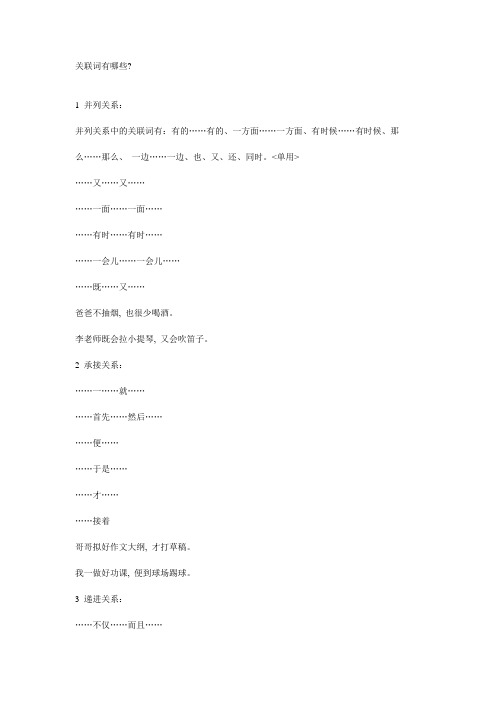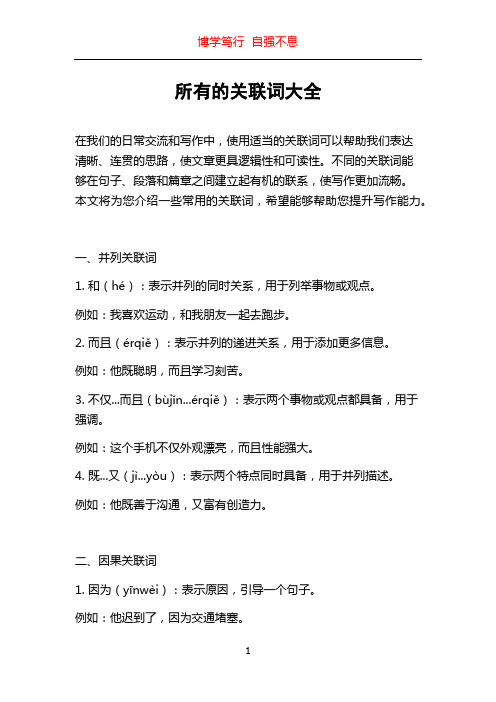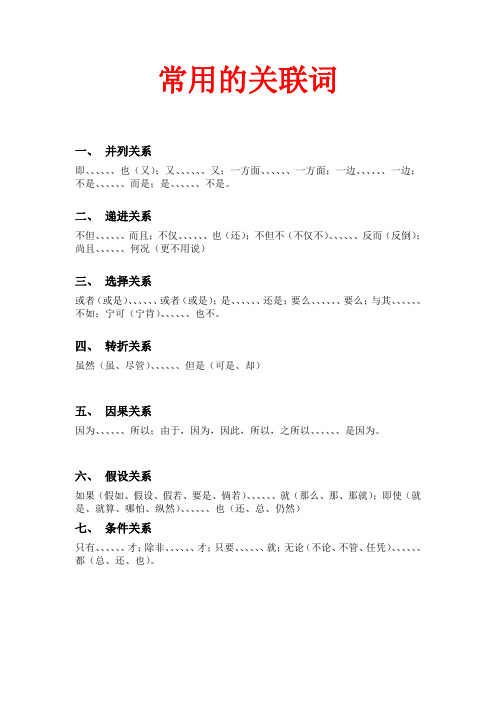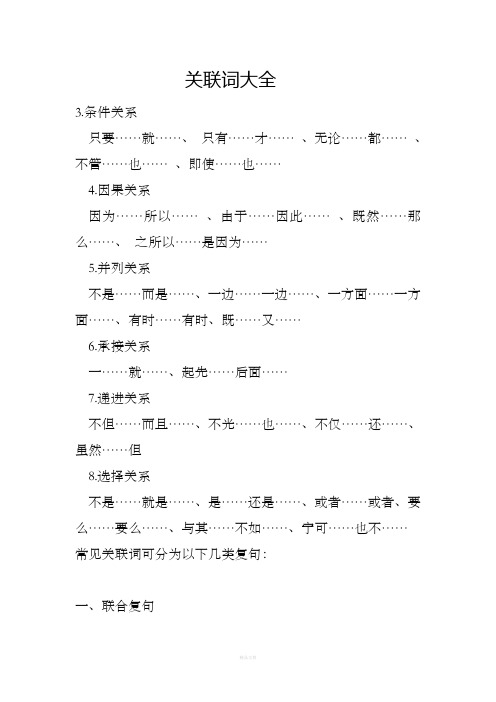关联词
关联词有哪些

关联词有哪些?1 并列关系:并列关系中的关联词有:有的……有的、一方面……一方面、有时候……有时候、那么……那么、一边……一边、也、又、还、同时。
<单用>……又……又…………一面……一面…………有时……有时…………一会儿……一会儿…………既……又……爸爸不抽烟, 也很少喝酒。
李老师既会拉小提琴, 又会吹笛子。
2 承接关系:……一……就…………首先……然后…………便…………于是…………才…………接着哥哥拟好作文大纲, 才打草稿。
我一做好功课, 便到球场踢球。
3 递进关系:……不仅……而且…………不但……还…………不但不……反而…………连……也…………何况…………甚至……滥用药物不但会损害心智, 还会造成不可复原的脑部损坏。
祖父尚且参加体育活动, 何况我们青少年呢!4 选择关系:是……还是、或者……或者、要么……要么、与其……不如、宁可……也(决)不。
……不是……就是…………或是……或是…………还是……日明喜爱球类运动, 每天清早, 他不是打球, 就是踢球去了。
我宁可给老师责罚, 也不说谎, 隐瞒真相。
5 转折关系:可是、但是、虽然……可是、虽然……但是、尽管……还、虽然(虽是、虽说、尽管、固然)……但是(但、可是、然而、却) 、却、不过、然而、只是。
尽管……可是……虽然……但是……尽管天气严寒, 可是伯父仍到海滩游泳。
妈妈爱静, 爸爸却爱动, 两人性格截然不同。
6 假设关系:如果……就、要是……就、即使……也、哪怕……也、如果(假使、假如、要是、倘若、要是)……那么(就) 、即使(就算、就是、哪怕、纵使) ……也(仍然、还是) 。
假设关系中的关联词有:取舍关系中的关联词有:宁可……也不、与其……不如。
如果明天下雨, 旅行就要取消了。
要是你不听爸爸的劝告, 那么定会闯祸。
7 条件关系:只要……就……只有……才……无论……都……不管……也……只要多读多写, 语文水平就可提高。
不管多少险阻, 我也无惧前进。
所有的关联词大全

所有的关联词大全在我们的日常交流和写作中,使用适当的关联词可以帮助我们表达清晰、连贯的思路,使文章更具逻辑性和可读性。
不同的关联词能够在句子、段落和篇章之间建立起有机的联系,使写作更加流畅。
本文将为您介绍一些常用的关联词,希望能够帮助您提升写作能力。
一、并列关联词1. 和(hé):表示并列的同时关系,用于列举事物或观点。
例如:我喜欢运动,和我朋友一起去跑步。
2. 而且(érqiě):表示并列的递进关系,用于添加更多信息。
例如:他既聪明,而且学习刻苦。
3. 不仅...而且(bùjǐn...érqiě):表示两个事物或观点都具备,用于强调。
例如:这个手机不仅外观漂亮,而且性能强大。
4. 既...又(jì...yòu):表示两个特点同时具备,用于并列描述。
例如:他既善于沟通,又富有创造力。
二、因果关联词1. 因为(yīnwèi):表示原因,引导一个句子。
例如:他迟到了,因为交通堵塞。
2. 所以(suǒyǐ):表示结果,引导一个句子。
例如:他早餐没吃,所以感到饥饿。
3. 因此(yīncǐ):表示因果关系,引导一个短语或句子。
例如:天气很热,因此我们决定去游泳。
三、转折关联词1. 但是(dànshì):表示转折,引出相反的情况。
例如:他很聪明,但是学习成绩不好。
2. 然而(rán'ér):表示承接上文,但有相反情况。
例如:尽管他很努力,然而成绩依然不理想。
3. 虽然...但是(suīrán...dànshì):表示承认前面提到的事实,但引出相反情况。
例如:虽然他很有才华,但是却没有充分利用。
四、条件关联词1. 如果(rúguǒ):表示条件,引导一个句子。
例如:如果明天下雨,我们就在家看电影。
2. 除非(chúfēi):表示唯一的条件,引导一个句子。
常用的关联词

常用的关联词
一、并列关系
即、、、、、、也(又);又、、、、、、又;一方面、、、、、、一方面;一边、、、、、、一边;不是、、、、、、而是;是、、、、、、不是。
二、递进关系
不但、、、、、、而且;不仅、、、、、、也(还);不但不(不仅不)、、、、、、反而(反倒);尚且、、、、、、何况(更不用说)
三、选择关系
或者(或是)、、、、、、或者(或是);是、、、、、、还是;要么、、、、、、要么;与其、、、、、、不如;宁可(宁肯)、、、、、、也不。
四、转折关系
虽然(虽、尽管)、、、、、、但是(可是、却)
五、因果关系
因为、、、、、、所以;由于,因为,因此,所以,之所以、、、、、、是因为。
六、假设关系
如果(假如、假设、假若、要是、倘若)、、、、、、就(那么、那、那就);即使(就是、就算、哪怕、纵然)、、、、、、也(还、总、仍然)
七、条件关系
只有、、、、、、才;除非、、、、、、才;只要、、、、、、就;无论(不论、不管、任凭)、、、、、、都(总、还、也)。
常见关联词大全

常见关联词大全在写作中,使用关联词可以使文章更加连贯,有助于提高文章的可读性,同时也可以将文章的逻辑更加清晰地呈现出来。
下面是一些常见的关联词,希望能够对您的写作有所帮助。
对比关系•与其… 不如…:表示“与其做某事不如做另一件事”。
•与…相比:与…相比,…:表示两者之间的比较。
•一方面…另一方面…:表示两种不同的情况。
•虽然…但是…:表示虽然有一定的意见分歧,但还有共同点。
•不是…而是…:表示肯定后者而否定前者。
•相反,…:表示与前面的观点相反的另一种观点。
•这不仅…而且…:表示两种情况并存。
因果关系•因为…所以…:表示因果关系。
•由于…因此…:表示由于某个原因所产生的结果。
•既然…就…:用于表示既然发生了某种情况,那么就应该采取相应的措施。
•由此可见…:用于强调结果的因果关系。
递进关系•不仅…而且…:表示在同一层次上的两个不同的方面。
•越来越…:表示随着时间的推移,某事情逐渐增加。
•不止…还包括…:强调某事情不仅仅是某个方面,还有其他方面。
•虽然…但是…:表示虽然存在一定的限制,但仍然不影响结果。
总结关系•总之,…:总结文章的主要内容。
•综上所述,…:从多个方面来总结文章需要传递的信息。
•从…来看,…:从不同的角度来看,得出相同的结论。
•总而言之,…:类似于“总之”,表示文章主旨的概括。
转折关系•尽管…但是…:表示虽然存在一定的限制,但仍然存在其他方面的好处。
•不过…:表示前后两种情况截然不同。
•然而…:用于表示不同寻常的情况。
•反而…:表示预料之外的结果。
并列关系•…和…:表示两种情况并列存在。
•不仅…而且…:表示在同一层次上的两个不同的方面。
•一般来说…,但是…:表示通常情况下某种事情是这样的,但是有时候也会出现不同的情况。
•不管…都…:表示不管发生什么都会达到某种结果。
比较关系•同样…也…:表示两个或多个不同的事物,但存在同样的特征或结果。
•可是,…:用于比较不同的方面。
•相似地,…:用于强调两件事情的相似之处。
关联词大全

关联词大全3.条件关系只要……就……、只有……才……、无论……都……、不管……也……、即使……也……4.因果关系因为……所以……、由于……因此……、既然……那么……、之所以……是因为……5.并列关系不是……而是……、一边……一边……、一方面……一方面……、有时……有时、既……又……6.承接关系一……就……、起先……后面……7.递进关系不但……而且……、不光……也……、不仅……还……、虽然……但8.选择关系不是……就是……、是……还是……、或者……或者、要么……要么……、与其……不如……、宁可……也不……常见关联词可分为以下几类复句:一、联合复句并列关系中的关联词有:有的……有的、一方面……一方面、有时候……有时候、那么……那么、既然……又、一边……一边、也、又、还、同时。
选择关系中的关联词有:是……还是、或者……或者、不是……就是、要么……要么、与其……不如、宁可……也(决)不。
转折关系中的关联词有:可是、但是、虽然……可是、虽然……但是、尽管……还、虽然(虽是、虽说、尽管、固然)……但是(但、可是、然而、却) 、却、不过、然而、只是。
因果关系中的关联词有:因此、因为……所以、既然……就、因为(由於)……所以(因此、因而)、之所以……是因为、既然(既)……就(便、则、那么)。
条件关系中的关联词有:只要……就、只有……才、凡是……都、不管……总、只有……才、除非……才、只要……就、无论(不论、不管、任凭)……都(也、还) 。
递进关系中的关联词有:不但……还、不仅……还、除了……还有、不但……而且、不但(不仅、不光)……而且(并且)、不但……还(也、又、更)、何况、而且、况且、尤其、甚至。
假设关系中的关联词有:如果……就、要是……就、即使……也、哪怕……也、如果(假使、假如、要是、倘若、要是)……那么(就) 、即使(就算、就是、哪怕、纵使)……也(仍然、还是) 。
取舍关系中的关联词有:宁可……也不、与其……不如。
对八种常见的关联词及其联系进行解析

对八种常见的关联词及其联系进行解析
1. 并列关联词
- 但是:表示转折关系,引导后面的内容与前面的内容相对立。
- 而且:表示并列关系,引导后面的内容与前面的内容有补充
或增加的关系。
2. 递进关联词
- 而:表示递进关系,引导后面的内容在程度或者时间上比前
面的内容更强。
- 何况:表示进一步递进的关系,引导的内容更加强调和突出。
3. 因果关联词
- 所以:表示因果关系,引导后面的内容是前面内容的结果或
原因。
- 因此:表示前面内容的原因或结果,引导后面的内容进一步
解释或补充。
4. 对比关联词
- 相反:表示对比关系,引导后面的内容与前面的内容相反或相对立。
- 让步虽然:表示进行对比的关系,引导后面的内容与前面的内容进行相对立或者补充对比。
以上八种常见的关联词在文章中的运用能够使句子和段落之间更加流畅,同时也能增加文章的逻辑性和可读性。
不同的关联词可以根据语境的不同进行灵活运用,以达到更好的表达效果。
为了使文章更加连贯,我们可以选择适合的关联词来连接不同的观点和论述,并且要确保关联词的使用没有法律上的复杂性或引用无法确认的内容。
总之,在写作过程中合理运用关联词是提高文章质量的关键之一。
通过巧妙使用并列、递进、因果和对比等关联词,我们能够给读者带来更好的阅读体验,使文章的结构更加清晰和有条理。
关联词大全
关联词大全一、并列关系:几个分句或者陈述相关的几件事情,或者陈述同一事物的几个方面。
常见的关联词:既……也(又);又……又;一方面……一方面;一边……一边;不是……而是;是…不是。
(妈妈一边看电视,一边织毛衣)(国家政府一方面要抓经济建设,一方面要抓政治文明建设)(六月的天一会儿下雨,一会儿晴。
)(我们即既要学习好,又要把身体素质搞上去。
)二、递进关系:后一分句所表达的意思比前一分句语意上更进一层,或者范围更广,或者程度更深,或者情况更甚。
常见的关联词:不但……而且;不仅……也;不但不(不仅不)……反而(反倒);尚且……何况(更不用说)。
(这个冬天不但很冷,而且下了好几场大雪)(他们一见面就吵架,甚至还动过手。
)(我们不仅要吃饱,还要吃好。
)三、选择关系:几个分句分别说出事情或几种事况,表示要从中选择一项。
常见的关联词:或者(或是)……或者(或是);是……还是;要么……要么;与其……不如;宁可(宁肯)……也不。
(这次的考试不是及格,就是不及格)(我每天要么骑自行车上学,要么坐公交车上学)(我们下午或者去洗澡,或者去打篮球)四、转折关系:后面的分句不是顺着前面分句的意思说下去,而是转了一个弯,跟前面分句的意思相反,或对前句加以修改补充。
常见的关联词:虽然(虽、尽管)……但是(可是、却);(这次试题虽然不是太难,但是得高分的还是不多)(我今天本打算去公园,可是天却下雨了)(尽管今天我很累,还是陪朋友去买东西)五、因果关系:一个分句说明原因,另一个分句说明这个原因所产生的结果。
这个结果可以是事实也可以是说话人所作的论断。
常见的关联词:因为……所以;由于;因为;因此;所以;之所以……是因为。
(因为天太冷,所以今天大家都穿上了棉衣。
)(每一个人都有不同的想法,因此在教学上应该因材施教。
)(既然今天一定要去听报告,就要把所有准备工作做好。
)六、假设关系:一个分句提出假设,另一个分句说明假设的情况实现后出现的结果。
常见的关联词
常见的关联词
以下是一些常见的关联词:
1.并列关系:
并且:我喜欢吃苹果,并且认为它们对身体有好处。
而且:她不仅聪明,而且勤奋。
2.转折关系:
但是:天气很晴朗,但是我们要去室内活动。
然而:他努力了很久,然而考试还是没有及格。
3.递进关系:
不仅:这个问题不仅复杂,而且解决起来很困难。
还:她不仅会唱歌,还会跳舞。
4.选择关系:
或者:你要么现在走,要么明天再走。
要么:你要么吃饭,要么饿着。
5.条件关系:
如果:如果你早点来,我就会带你去参观博物馆。
只要:只要你有时间,我们就可以一起去购物。
6.因果关系:
因为:因为我生病了,所以我没有去上学。
因此:他每天锻炼,因此身体很健康。
7.假设关系:
假如:假如我有钱,我就会去环游世界。
倘若:倘若明天不下雨,我们就去野餐。
8.对比关系:
然而:他的成绩很好,然而他的态度却不端正。
反之:如果你想减肥,那就不能继续吃垃圾食品。
9.转折对比关系:
却:他虽然很穷,却很快乐。
然而:看起来很简单的任务,实际上却很难完成。
10.结果对比关系:
因此:他每天都早起,因此他精神很好。
所以:她没吃早餐,所以她在上午感到饿了。
这些关联词在句子中的使用,有助于表达不同的逻辑关系,使句子和段落更加清晰和连贯。
关联词大全
关联词大全并列关系中的关联词有:一方面……一方面、那么……那么、既然……又、一边……一边选择关系中的关联词有:是……还是、或者……或者、不是……就是、要么……要么、与其……不如、宁可……也不、不是……而是……转折关系中的关联词有:虽然……可是、虽然……但是、尽管……还因果关系中的关联词有:因为……所以、既然……就、之所以……是因为条件关系中的关联词有:只要……就、只有……才、不管……总、只有……才、无论 (不论、不管、任凭)……都(也、还) 。
递进关系中的关联词有:不但……还、不仅……还假设关系中的关联词有:如果……就、要是……就、即使……也一、并列关系:几个分句或者陈述相关的几件事情,或者陈述同一事物的几个方面。
二、递进关系:后一分句所表达的意思比前一分句语意上更进一层,或者范围更广,或者程度更深,或者情况更甚。
三、选择关系:几个分句分别说出事情或几种事况,表示要从中选择一项。
四、转折关系:后面的分句不是顺着前面分句的意思说下去,而是转了一个弯,跟前面分句的意思相反,或对前句加以修改补充。
五、因果关系:一个分句说明原因,另一个分句说明这个原因所产生的结果。
这个结果可以是事实也可以是说话人所作的论断。
六、假设关系:一个分句提出假设,另一个分句说明假设的情况实现后出现的结果。
七、条件关系:一个分句提出条件,另一个分句说明在这条件下产生的结果。
关联词填空1、()风吹雨打,我们()坚持到校学习。
2、()成绩再好,你()不能自满呀!3、我()这么用功,()成绩还是不如你5、()雨再大,路再滑,我们()要按时报到。
6、这种境界,()使人惊叹,()叫人舒服。
7、()怎么拥挤,他()能挤过去。
8、四合院的房子与房子之间,()相互连接,()各自分开,有分有合。
9、雷锋()死了,()他的精神永远在我们心中。
10、这个橡皮()我的,()李明的。
11、这样的住宅()有些拥挤、杂乱,()非常适合人与人之间的交流。
12、()水再上涨,江堤()有危险。
常用的关联词有哪些
常用的关联词有哪些
常用的关联词有哪些写作文就需要运用到关联词语,这样才能让文章的上下句更加的具有链接性,才能让文章更加的出色。
那么常用的关联词语有哪些呢?
常用的关联词语:
1.转折关系
尽管可是、虽然但是、却、然而
2.假设关系
如果就、即使也、要是那么、倘若就、既然就
3.条件关系
只要就、只有才、无论都、不管也、即使也
4.因果关系
因为所以、由于因此、既然那么、既然就、之所以是因为
5.并列关系
不仅而且、一边一边、一方面一方面、有时有时、既又、不是而是。
- 1、下载文档前请自行甄别文档内容的完整性,平台不提供额外的编辑、内容补充、找答案等附加服务。
- 2、"仅部分预览"的文档,不可在线预览部分如存在完整性等问题,可反馈申请退款(可完整预览的文档不适用该条件!)。
- 3、如文档侵犯您的权益,请联系客服反馈,我们会尽快为您处理(人工客服工作时间:9:00-18:30)。
Some words and phrases used to begin a sentence that show linkage to the previous sentence (关联词)(Also called 'discourse markers')•If you use any of these examples as the first words in an answer,the linkage is to the question theexaminer asked or a statement theexaminer made.•As well as showing linkage, these words and phrases act as anintroduction to what you aregoing to say.•There is a slight pause after you say these expressions before youcontinue speaking. In writing,these words and expressions arefollowed by a comma.•Remember: If you don‟t clearly show that you can use a lot ofthese, you won‟t get a 6 (or above)for Coherence and therefore youwon‟t get a 6 (or above) for theFluency and Coherence sub-score.•Don't overuse any one of theexamples shown below. Instead,show variety.•…Informal‟ words and expressions are good to use in the Speakingtest! (But not …slang‟ words andexpressions.)•Those words or expressionslabeled as …a little formal‟ aremost suitable when talking aboutrather serious or abstract topics,such as in Part 3. However, don‟tuse too many of those marked as,“a little formal” in the Speakingtest and I suggest not using anyone of those more than once. •Any words or expressions labeled as …very formal‟ should only beused in the most serious oracademic-style language, which isusually either a formal speech oracademic writing. It is notconsidered …wrong‟ if you do usethese in the test but it will makeyour speaking sound a bitunnatural, like reading from abook. The only example here is…moreover‟.•Most of these are used to begin a sentence but a few are usuallyused as conjunctions within asentence. However, in speaking,these sound almost as if they arebeginning a new sentence.•I recommend that you check ina good English-Chinesedictionary (a big one) to see theChinese translation of thesewords and expressions and tosee the examples in thedictionary. Then write andspeak a few of your ownexamples.•Later, more examples and some Chinese translations will be addedto this page.•See also the list of ADVERBS.Those adverbs listed under 'A' arealso excellent ways to make yourlanguage more cohesive (=linked). Some of these adverbsare included below.•After you've read this page, you might want to try this online quiz.********************************** 1. Stating two contrasting points in abalanced way, not emphasizingthe difference2. Stating two contrasting points andemphasizing the difference3. Talking about Similarity (相似,类似)4. Contradicting(反驳)5. Concession(concede (v): 承认某事属实,有效,合理等)6. Concession and CounterArgument(反论点)7. Persuading (说服)8. Dismissal of Previous Discourse(解雇前话语)9. Adding; Giving More Details10. Giving Examples11. Being More Specific12. Clarifying13. Summarizing14. Speaking in General15. Exception16. Stating the Purpose17. Emphasizing18. Giving Reasons19. Talking about the Result20. Giving a conclusion based on alogical argument21. Parallel Time22. Changing the Subject23. Returning to a Previous Subject 24. Gaining Time to Think25. Talking about the Beginning26. Talking about the End************************************** 1. Stating two contrasting points in abalanced way, not emphasizingthe differenceOn the other hand (另一方面)I can‟t decide which country to study in. Britain has many universities and a long history, so it would be interesting to study there. On the other hand, Australia has a nicer climate. It‟s a difficult decision. Alternatively (作为一种选择)You could get a degree in accountancy in Britain. Alternatively, you could do it in Australia or New Zealand.Then again (然而) (Used when an alternative idea suddenly comes to mind.)We might get married this year. Then again, we might delay it for a year or two – wehaven‟t decided yet.--------------------------------------------------------- 2. Stating two contrasting points and emphasizing the differenceHowever (A little formal)I‟m interested in science and computers. However, my sister‟s more interested in art and music.Nevertheless (a little formal) (不过, 虽然如此, 然而,仍然)I wouldn‟t say that all advertisements are a bad influence on children – some of them are quiteinformative and entertaining. Nevertheless, I think some advertisements might be detrimental to children. For example, …Having said that = That said(A little formal. Stress on the word, “said”. Meaning = “Even though I just said …A‟, an alternative or opposing idea, …B‟ is also true.”)Learning English isn‟t easy; it takes hard work and practice. Having said that, many peopledo become quite fluent after a few years of study.At the same time (但是,然而)I think good teachers have to be quite strict in order to keep the class under control. At the same time, teachers should be warm and friendly so the students can relate to them as human beings.All/Just the same (仍然,尽管如此) Studying overseas can be wonderful experience for students. All the same, they have to work very hard to make up for their language deficiencies.Mind you (你要知道)(Esp. British English. Stress on the word, …you‟. Informal = good to use! Meaning = “Even though I just said …A‟, don‟t forget this important opposing or contrasting point, 'B'.”)To tell you the truth, I don‟t really like my job very much. Mind you, the salary‟s quite good! Still (还是,然而)It‟s going to take me a few ye ars and quite a lot of money before I get my doctorate. Still, I think it‟ll be worth it in the end because …Yet (还是,然而)He does the least study of any of us, yet he almost always gets the best grades!Instead (代替)Don't overuse any of the examples shown here. Instead, show a variety of ways to express your meaning.I don't read newspapers very often nowadays. Instead, I either watch the news on TV or I read it on the internet.In spite of (this, that); Despite this; Despite that (但仍然)The second hotel was more expensive than the first one, about double the room rate, in fact. In spite of the cost, we chose to stay at the second one because we wanted a taste of luxury for a night.Even so (尽管情况如此)(In writing this is within a single sentence but in speaking it sounds like it is beginning a new sentence.)Studying a foreign language overseas is much more expensive than studying it at home; (but,) even so,it‟s definitely the best way to learn a language.Conversely (相反. Very good for academic writing, especially Task 1 in the Writing test, but too formal for everyday speech)Global warming will probably result in some farming areas in the warm parts of the world becoming arid and unusable. Conversely, places that are too cold for farming now might become suitable for farming as they become warmer.In contrast (相反)Young people like films that are full of excitement and romance, reflecting how they feel about things. In contrast, older people prefer more subtle and thoughtful films.--------------------------------------------------------- 3. Talking about Similarity (相似,类似)likewise;Similarly (也,同样) (Hard to pronounce!) Yes, I think there should be a little more emphasis on practical skills, especially in primary school. Similarly, in high school and university, there should be more emphasis on the practical application of what students learn at school.In the same way (Also: In a similar way)My grandmother taught my mother how to cook when she was just a child. In the same way, my mother taught me when I was about ten years old.By the same token (相应地;基于同一理由) Yes, I think we should try to follow the advice of our parents. By the same token, parents should consider what their children really want, not just what they themselves want.--------------------------------------------------------- 4. Contradicting(反驳)On the contrary (恰恰相反, 那不对) Note: Many students incorrectly think that this means the same as, …On the other hand.‟ It does not. There are two usages of, …on the contrary‟.Usage a): The most common meaning is: “That’s untrue and I’ll tell you the true situation.” Or, “I disagree and this is what I think.”Examples:A: “I guess you're Canadian.”B: “On the contrary, I'm Australian.”------------------------------A: “I heard you live in a big house.”B: “On the contrary, I live in a small apartment.”------------------------------A: “But it was completely unexpected.”B: “On the contrary, (I think) it was planned to happen that way.”------------------------------Usage b):Here is an example of "Usage b".Speaker 1: “I think that's ugly.”Speaker 2: “I don‟t think it‟s ugly at all. On the contrary, I think it‟s quite beautiful.”Here, “I don‟t think it‟s ugly” = “I think it‟s beautiful” in meaning. Both of these statem ents contradict what Speaker 1 said but the second, positive statement is more emphatic than the first, negative statement.It is possible for Speaker 2 to simply answer, “On the contrary, I think it‟s quite beautiful.” but the usual usage is to first contradict what the other person said.------------------------------In usage b), the form of the statement is this: negative statement + "On the contrary" + positive statement.And, the negative statement = the positive statement in meaning.The meaning of “On the contrary” here is similar to saying, “in fact”, “as a matter of fact” or “actually”.In both usage a) and usage b), “On the contrary” is used when talking (or writing) about two ideas (facts, opinions, beliefs or feelings) that are 180° in opposition to each other.------------------------------In the following example, the speaker or writer first makes a negative statement, “would not fail.”“Eventually, I came to believe that I wouldn‟t fail. On the contrary, I became convinced that I woul d succeed very well.”This could either be a written statement or a spoken statement. It either case, it has a rather literary (文学的) or formal tone. The statement is similar to correcting or contradicting another person where, in this case, the "other person" is the speaker or writer himself and his earlier feelings about his own success. That is, originally this person believed, "I might fail" then he changed to have confidence that he would not fail.------------------------------The following example is similar to the one above in structure. However, although the use of, “On the contrary” here is acceptable it would be more suitable to use, “in fact” or, “as a matter of fact” because the speaker or writer is not correcting or contradicting another person but instead, is simply writing a description of the cost of houses in Beijing, a description that begins with a negative statement.A house with a garden in Beijing is not cheap. On the contrary, a house with a garden in Beijing is very expensive.On the other hand, the following example of usage a) is suitable because Speaker 2 is correcting Speaker 1.Speaker 1: “I was told that a house with a garden in Beijing was quite cheap.”Speaker 2: “On the contrary, a house with a garden in Beijing is very expe nsive.”Advice about using, "On the contrary"in the Writing testIn general, I think most IELTS candidates should be careful about using “On the contrary” in the Writing test. In fact, it would be better to use alternative ways to express yourself, su ch as, “in fact” or, “as a matter of fact”. “On the contrary” is mostly used in speaking (usage a) and its use in writing (usage b) can sometimes have a tone that is unnecessarily formal or literary. Not only that, when you use the words, "On the contrary", you should be contradicting or correctingsomeone. In the writing test, this "someone" would usually be "some people" who believe or state a certain opinion, which you feel you can prove to be erroneous.--------------------------------------------------------- 5. Concession(concede (v): 承认某事属实,有效,合理等)(These examples of concession are often followed by a counter argument (反论点) beginning with 'but' or some similar word or phrase.)These beginning words can be used to concede that the other speaker is correct.Of course; Admittedly; Naturally; Obviously; Clearly; Undeniably; UndoubtedlyOf course, there‟s always an exception to the rule but, in general, I still stand by what I said.Admittedly, some people do waste money but I think the majority of people are pretty careful with their money.Naturally, I hope to find a job that‟s both interesting and well paid but, realistically, such jobs are hard to find when a person first starts working.Obviously, there‟d be fewer cars on the roads if they were much more expensive to buy. Undoubtedly, millions of cars do produce air pollution but I‟d say that the thousands of trucks that come into and leave the city during the night produce a lot of the air pollution that we see when we wake up in the morning. You only have to see the pollution produced by one dirty, old truck to know that.---------------------------------------------------------6. Concession and Counter Argument 'All the same' (see above) is another way to continue defending your opinion after conceding that the other person is not 100% wrong in his/her opinion.Yes, I agree that some young people are spendthrifts but, all the same, the majority are not like that.---------------------------------------------------------7. Persuading (说服)After all (毕竟,终究,归根结底); You have to admitMost Chinese people about the age of twenty make their own decisions about important things in life. After all,they‟re adults at that age.---------------------------------------------------------8. Dismissal of Previous Discourse(解雇前话语)(See also …besides‟ in 9. Adding, below.) Anyway = Anyhow (无论如何) = At any rate (无论如何, 不管怎样) = In any case (无论如何, 总之)Anyway, I eventually got there and nobody noticed that I was late! (After telling a story about being late.)At least (反正, 无论如何)At least I got there before the main part of the ceremony. (After telling a story about being late.) (Notice no comma used after, …At least‟)--------------------------------------------------------- 9. Adding; Giving More DetailsAs well as that (= Not only that) (informal; good for speaking)Art classes for, say, primary school children encourage the development of the imagination, creativity and self-expression. As well as that, these art classes provide an opportunity for those who have special artistic talent to become aware of this talent; they might never have known they had this talent if they had never had the opportunity to attend an art class. On top of that (informal; good for speaking)Well, firstly, emails are much faster and cheaper than handwritten letters. On top of that, they‟re much more convenient – you can read or write emails with just a few strokes of thekeyboard, without worrying about paper, envelopes and stamps and going out to mail your letters.Another thing isI think the latest video technology is in many ways superior to books in educational value because this technology has written words but also has information in audio and video form. Another thing is, it‟s easier to store and carry around a disc than a book that holds the same amount of information.For that matter (Similar to, “As a matter of fact”, “In fact” and“Actually”)To tell you the truth, I‟m not very interested in basketball. For that matter, I‟m not very interested in any sport.Besides(= “而且” + “无论如何” or “而且” + “不管怎样” 的意思)I haven‟t seen that film. Besides, I‟ve heard it‟s not very good.There‟s a restaurant near my home but I don‟t often go there because it‟s too expensive and, to be quite frank, I don‟t like their service –they‟re much too slow. Besides, right now I‟m too busy to eat out very often.Note: …Besides‟ is different to, …in addition‟ because the word …besides‟ introduces another idea that is in a different category, or a different …train of thought‟ to the other idea(s). In the previous example, the first two reasons were criticisms of the restaurant; the last reason was separate from these reasons but, overall, was still an additional reason why the speaker does not eat at the restaurant very often. What’s more (This sounds a little too formal and unnatural if not spoken in the contracted form. In other words, don‟t say, “What is more”)Yes, I think the internet has changed people‟s reading habits – for the better. I say thatbecause now we can tap into a much larger range of, and volume of reading material than we could when we just relied on our collection of books at home. What’s more, topics such as current events are being updated daily so we can always be up to date with the news.Furthermore (a little formal)Actually, I think academic skills are more important than practical skills because, if you have highly developed academic skills you can usually get highly paid work. Furthermore, I think in the future, society will value those who have brainpower more than those people who can do practical things with their hands.In addition (a little formal)Reading allows people to become aware of their society and, in fact the whole world. In addition, reading is the main way that people increase their education and we all need to continually learn in order to make progress in our careers.Moreover (Very formal. It is best not to use this in the speaking test but it is suitable for academic writing)Advertisements that glorify violence are a negative influence on children. Moreover, I think they‟re a negative influence on anyone who sees them, not just children.--------------------------------------------------------- 10. Giving ExamplesFor example; For instance; As an example; To begin with; To start with; For a start;--------------------------------------------------------- 11. Being More SpecificSpecifically; To be more specific; In particular; As a matter of fact; In fact; Actually---------------------------------------------------------12. ClarifyingI mean; What I mean is; To put that another way; What I'm trying to say is; My point is ; In other words; That is (a little formal); That is to say (a little formal)--------------------------------------------------------- 13. SummarizingOverall; On the whole; Basically; Fundamentally;--------------------------------------------------------- 14. Speaking in General Generally, In general; Typically---------------------------------------------------------15. ExceptionOtherwise--------------------------------------------------------- 16. Stating the Purpose(In order) to (+ verb); (In order) to achieve this--------------------------------------------------------- 17. EmphasizingAbove all;Indeed (a little formal)Q: Do your friends also like that kind of film? A: Indeed they do!--------------------------------------------------------- 18. Giving ReasonsIn the first place; For one thing; The main reason why …; One of the reasons why …; One reason why …--------------------------------------------------------- 19. Talking about the ResultAs a result; As a consequence; Consequently; So; Because of this; In this/that way--------------------------------------------------------- 20. Giving a conclusion based on a logical argumentSo; Therefore(a little formal); [‘Thus’ and‘hence’ are too formal even for the Writing test]--------------------------------------------------------- 21. Parallel TimeAt the same time; Simultaneously; Meanwhile; In the meantime--------------------------------------------------------- 22. Changing the Subject(It is uncommon to suddenly and completely change the subject when you speak in the IELTS test.)By the way; Incidentally“Yes, I had a good day at work. By the way, I saw your friend, Jenny, at lunchtime.”--------------------------------------------------------- 23. Returning to a Previous SubjectAs I was saying; As I mentioned before--------------------------------------------------------- 24. Gaining Time to Think(Important for avoiding long pauses, which decrease your fluency score.)Let me see; Let’s see; Well; You know(Do not emphasize the word “you” when you say this. Only emphasize “you” when your meaningis, “你已经知道吧!”)--------------------------------------------------------- 25.Talking about the BeginningFirst, Firstly, First of all, To begin with, In the first place, (These mean 首先, 第一) Avoid using, “First and foremost” in the speaking and writing tests because it usually sounds like a cliché (陈腔滥调). At first, Initially, Originally, In the beginning, At the beginning, (These mean 起初, 当初)Note that “At first” does not mean the same as “First” or “Firstly”.--------------------------------------------------------- 26. Talking about the EndLa s t= Lastly = Finally = 最后These three are used for listing several things that happen in sequence: “First, ….. Next, …. Then, … Last/lastly/finally ….”Note 1: Beware of the following common error:At (long) last = Finally = 终于Many students write or say “at last” to mean “last”(最后) but this is a mistak e. “At last” has the idea that someone has waited for a long time and it is usually used as an exclamation (叹词).Examples:(After wandering in the desert looking for water.) “At last!Water!” = “Finally! Water!”(After waiting for someone who is late.) “At last!You‟ve arrived!” = “Finally!You‟ve arrived!”(After looking for someone for a long time) “We‟ve found you at last!” = “Finally, we‟ve found you!”最后终于finally,lastly,lastfinally,at (long) lastNote 2: The expression “Last but not least,” is (rather informal) spoken English and is not really suitable for academic writing. It is used to place special emphasis on the importance of the last item of a list, even though it was listed last. For example, this expression is often used when introducing several people, one at a time – we use this expression before introducing the last person in order not to offend that person by having put him or her last. And in that situation it is often spoken in a jocular (滑稽的) way.It is possible to use “Last but not least,” in the Speaking test but it has become overused in China and is rarely used in a suitable situation. It doesn't impress most examiners so it is best to avoid it even in the Speaking test. It would be better to say, “And last, but still very important, is...”************************。
